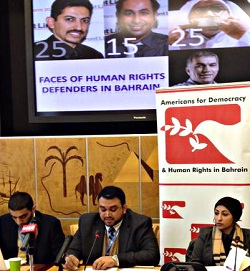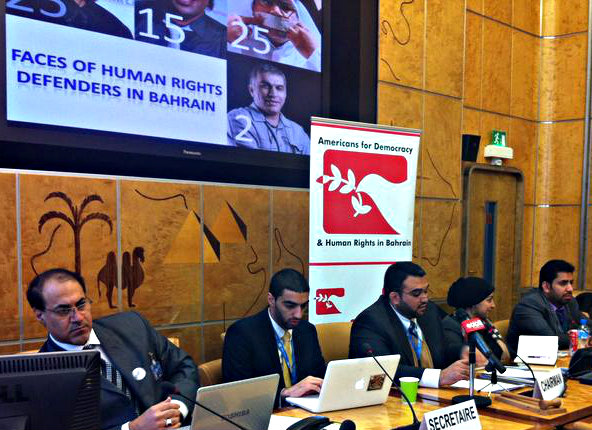On 14 March, Americans for Democracy and Human Rights in Bahrain (ADHRB) hosted an event at the 25th session of the United Nations Human Rights Council (HRC) examining the Government of Bahrain’s targeting of human rights defenders on the ground. The event was held with participation from and in partnership with: Al-Salam Foundation, Bahrain Human Rights Observatory (BHRO), Bahrain Youth Society for Human Rights (BYSHR), Bahrain Institute for Rights and Democracy (BIRD), and Bahrain Center for Human Rights (BCHR).
ADHRB Executive Director Husain Abdulla began by noting that “reprisals against human rights defenders in Bahrain (were) a serious and ongoing issue long before” the February 2011 Bahrain uprising began. Mr. Abdulla highlighted reports from Reporters Without Borders, Frontline Defenders, and the U.S. State Department that all document the serious abuses human rights defenders face for bringing to light government abuses in Bahrain.
“Reprisals against human rights defenders (in Bahrain) come in many forms,” BCHR’s Maryam al-Khawaja said. Mr. al-Maskati recalled the mistreatment prominent Bahraini human rights activists Abdulhadi al-Khawaja faced during his arrest, noting that “he was beaten a lot and he was unconscious.” Mohammed al-Tajer from BHRO said he continues to be targeted for his human rights work years after his release from prison, describing a threatening message he received in which he was told to “shut your mouth.”
“When we talk about human rights defenders, we’re not talking about an elite group of specific individuals working for NGOs,” BIRD’s Ahmed Ali said. “We have thousands of them in Bahrain – they are sitting in prison, they are in exile, they are everywhere around the world,” he said. BYSHR’s Mohammed al-Maskati noted that human rights defenders in Bahrain are on the front line of the struggle for human rights on the ground. “The human rights defenders in Bahrain are trying to train people on how to use non-violent strategies to keep their struggle in Bahrain peaceful,” al-Maskati said.
Panelists also discussed what members of the HRC and the international community could do to move Bahrain toward necessary human rights and political reforms. Mr. Abdulla urged member States to call on the Bahrain government “to release all human rights defenders that have been imprisoned” and to “allow international NGOs and pertinent U.N. Special Procedures … into the country.” Mr. Al-Maskati called on the international community to go beyond issuing statements and conducting closed-door meetings with the Bahrain government by utilizing visa bans and individual sanctions against violators of human rights. Ms. al-Khawaja urged the international community to “come to the realization that … national and international interests lie only with governments that respect human rights.”






